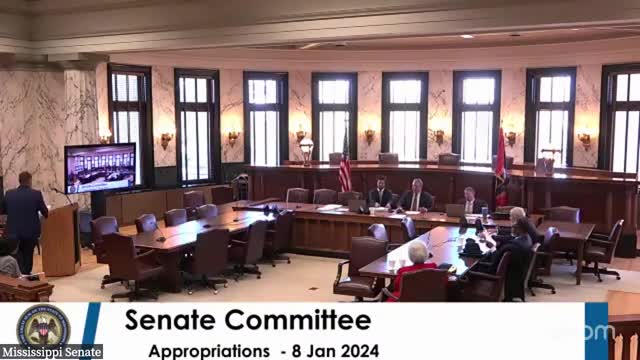Mississippi education officials present 10 spending priorities for 2026, including SAO transfer and MSFF increase
Get AI-powered insights, summaries, and transcripts
Subscribe
Summary
Mississippi Department of Education officials told the Appropriations Committee they seek funding for 10 fiscal priorities for FY2026, including transferring school attendance officers to local districts, funding a teaching residency, expanding early childhood supports and an updated Mississippi Student Funding Formula base.
The Mississippi Department of Education on Wednesday outlined 10 fiscal priorities for fiscal 2026 — including a plan to transfer school attendance officers to local districts, an expansion of early childhood coaching, and funding tied to the Mississippi Student Funding Formula — during a presentation to the Appropriations Committee, department officials said.
Department officials said the package is intended to address chronic absenteeism, teacher shortages, school safety and rising operating costs across the state’s districts. Dr. Evans, speaking for the department, said the priorities are ranked and that the department would answer questions throughout the presentation.
The top priority would transfer school attendance officers (SAOs) from the state department to local school districts and increase SAO pay. "I think that's very important that we maintain that," Dr. Evans said of keeping a regulatory oversight arm in the department even if SAOs move under local supervision. He said the transfer would allow superintendents to directly supervise SAOs and would fund a roughly 25% pay increase (the speaker described a move from about $24,000 to about $34,000 but said the figure should not be treated as exact). The department said the move is partly driven by districts’ requests and the difficulty of recruiting SAOs at current pay levels.
On teacher pipeline issues, the department requested $6,800,000 for the Mississippi Teaching Residency (MTR) program, which the department said would fund 189 residents across five university educator-preparation programs: Delta State University, Jackson State University, the University of Mississippi, the University of Southern Mississippi and William Carey University.
The presentation also requested funding for accreditation review teams to support about 25 on-site visits that the department said are needed to verify districts’ compliance with state and federal requirements, including school safety standards.
School safety funding: The department asked for a $1,000,000 increase to the MCOPS grant program, which currently has a $3,000,000 budget. The department described the grant as providing up to $10,000 per district position with a required 50% local match; officials said the requested increase would allow the state to support about 100 additional school resource officers (SROs).
Assessment and test security: Officials requested a $2,700,000 increase for statewide assessments and test-security work. Dr. Evans said the state is entering a new assessment window after roughly 10 years with the current system and expects a mega RFP to move the state toward a single major assessment vendor and a fully computer-based assessment platform. He said the change would let the department offer a statewide benchmarking system to districts at no charge and would address rising costs of creating test items and conducting security audits.
Technology and operations: The department asked for funding covering OTSS and MSIS operations, citing ongoing licensing, professional services and aging equipment that the department says must be replaced. Dr. Evans said the MSIS portion is roughly $1.0–$1.2 million of that request and that, if funded, the department would reduce similar requests in future budgets.
Mississippi School for the Deaf and Blind (MSDB): The department requested additional operating funds for MSDB to address rising costs including braille services and transportation; the department said MSDB's total operating budget is about $13.6 million and the request includes about $1.6 million in added funding.
Innovation and career readiness: A $3,000,000 increase was requested for innovative programs, including funding for the state’s college- and career-readiness platform (the department identified Major Clarity and a career-interest tool called UScience) and grants to districts to support local innovation and individual success plans (ISPs) for secondary students.
Early childhood: The department requested $6,700,000 to expand early-childhood supports. Officials said the proposal would fund 48 early-learning coaches to serve 40 early-learning collaboratives and 23 state-invested pre-K programs. Dr. Evans said the funding is intended to reduce student–teacher ratios and expand access so ZIP code does not limit participation.
Driver’s education: In accordance with SB 2695, the department proposed roughly $10,800,000 to support a statewide driver’s education program. Dr. Evans described that figure as a general estimate and said he expects the final cost could be higher; he said the department is working with Commissioner Bridal on cost-effective options.
Mississippi Student Funding Formula (MSFF): Dr. Gavin told the committee the department, working with an independent CPA, calculated a new FY26 base student cost at $6,842.61, up from the FY25 base of $6,695.34; she said the calculation included a $43.52 inflation adjustment and changes for insurance and PERS rate increases. Dr. Gavin reported that net enrollment fell about 1% (4,505 students) and said the total year-over-year change in the formula was $12,111,386.
Committee questions and next steps: Committee members asked whether selected requests would be one-time or recurring. Dr. Evans said the early-childhood request would be recurring if enacted and that the MSIS request should decline if the department receives funding this year. On a question about including 7th- and 8th-grade secondary CTE students in the CTE weight, Dr. Gavin said the department can calculate the impact and agreed to provide those figures to committee staff. No formal votes were taken during the session.
The committee chair closed the presentation and reminded members the next meeting is scheduled for 9:30 a.m. in room 210 the following morning.
